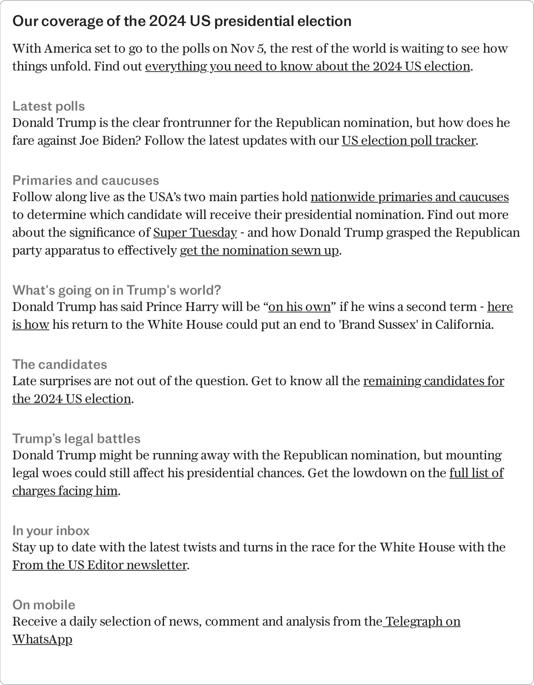Donald Trump signals he would not defend Taiwan from Chinese
Donald Trump has indicated that the US might not defend Taiwan against a Chinese invasion if he were president, citing that Taiwan has become wealthy by “stealing” US microchip production.
The Republican nominee for the 2024 election stated that Taipei “should pay” Washington for its defense, highlighting that the island nation is 9,500 miles away and “doesn’t give us anything” in return.
In his recent remarks, Trump cast doubt on whether US support for Taiwan would persist if he won a second term, as polls suggest he might in the upcoming November presidential election.
When asked about defending the island, which Beijing has vowed to annex, Trump avoided a direct answer. In an interview with Bloomberg, he said, “I think Taiwan should pay us for defense. You know, we’re no different than an insurance company. Taiwan doesn’t give us anything.”
Trump also expressed frustration, saying the island “took all of our [semiconductor] chip business” and described Taiwan as “immensely wealthy.” He added, “I mean, how stupid are we?”
Taiwan, a self-governing island, produces approximately 90 percent of the world’s advanced semiconductor chips, which are essential for everything from smartphones to AI applications. These chips are crucial for major American companies, including Apple and Nvidia.
While Washington does not officially recognize Taiwan diplomatically, it remains a vital partner and a significant recipient of US weapons. Recently, Congress passed an $8 billion (£6.15 billion) military aid package with bipartisan support, aimed at countering Beijing’s influence in the region.
The longstanding US policy towards the island is one of “strategic ambiguity”. However, Joe Biden has said on several occasions he would come to Taiwan’s aid in the event of an invasion.
Speaking to Bloomberg, Trump described Taiwan as “the apple of President Xi’s eye” and noted that it “is 9,500 miles away” from the US, while it is “68 miles away from China”.
Xi has ramped up unification rhetoric
Beijing has refused to rule out the use of force in bringing Taiwan under its control, while Xi Jinping has ramped up rhetoric about “unification” being “inevitable”.
In response to Trump’s comments, Cho Jung-tai, Taiwan’s premier, pointed out that Taipei had steadily boosted its defence budget in recent years.
“We are also clear that Taiwan-US relations have been very strong in recent years,” he said.
“Maintaining the peace and stability of the Taiwan Strait and Indo-Pacific region is our common responsibility and goal.”
Countering a rising China is a key aim of Republicans in Congress, even among isolationists who broadly share Trump’s America First approach.
Trump’s latest rhetoric around Taiwan appears contrary to that of his running mate, JD Vance.
The Ohio senator described Beijing as “the biggest threat to our country” in an interview this week and has said “we should make it as hard as possible for China to take Taiwan in the first place”.
Former rival Haley booed as she endorses Trump
Earlier, former Trump rivals took to the podium and called for Republican unity – but received a mixed response.
Nikki Haley, Trump’s former UN ambassador, received some boos from the crowd when she appeared on stage.
Ms Haley, who dropped her challenge to Trump’s candidacy after losing every state but one in the early slate of contests, was a last-minute addition to the programme.
She began her speech by noting she had been invited to speak by Trump “in the name of unity”, and used the occasion to explicitly endorse Trump, something she has delayed doing for months.
She said: “You don’t have to agree with Trump 100 per cent of the time to vote for him. Take it from me. I haven’t always agreed with President Trump. But we agree more often than we disagree.”
Trump, observing from a private box, remained unsmiling through most of Nikki Haley’s remarks but broke into laughter when she mentioned their disagreements and applauded her calls for party unity.
On Thursday night, the 78-year-old is set to formally accept the GOP nomination with a keynote address. In light of the recent assassination attempt, he has reportedly revised his speech to emphasize the importance of presenting a united front.
Other former Trump rivals, including Florida Governor Ron DeSantis and entrepreneur Vivek Ramaswamy, also expressed their enthusiastic support for him as the party nominee in their convention speeches.

I’m gonna be president, boasts Trump
The Trump campaign is feeling increasingly confident about a November victory, buoyed by Mr. Biden’s poor debate performance and internal Democratic disputes over the 81-year-old’s chances in the election.
In an interview with Bloomberg, Trump expressed his optimism, stating, “I’m doing well in the polls and I’m gonna be president.”
He dismissed concerns that his criminal conviction in New York might deter voters, claiming to have raised “hundreds of millions of dollars” since the guilty verdict.
Trump also made it clear that he has no intention of pardoning himself for the federal charges he faces if he returns to the presidency.
Additionally, he touched on his positive relationship with Saudi Crown Prince Mohammed bin Salman, mentioning that they still occasionally communicate.
“It’s been a while, but I have a very good relationship with him,” Trump remarked.
Perfect piece of work you have done, this site is really cool with excellent info .
so much fantastic information on here, : D.